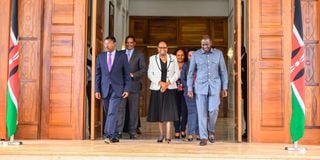
President William Ruto and Chief Justice Martha Koome after a dilalogue meeting that brought together the leadership of the Judiciary, Legislature and Executive at State House Nairobi.
A petition seeking for the removal of Chief Justice Martha Koome from office is the latest in the escalating fight pitting the executive and the judiciary, just days after the government lost a string of court cases.
The executive, led by President William Ruto and senior Kenya Kwanza lawmakers, had kicked up a storm by targeting judges for allegedly taking bribes to rule against certain government policies.
The President has consistently claimed that some unnamed judges were working with his opponents to frustrate his key projects like affordable housing and universal healthcare.
Deputy President Rigathi Gachagua had even threatened to petition the Judicial Service Commission (JSC) to probe a judge who made decisions in one of his corruption-related cases. He later dropped this to give dialogue between the executive and the judiciary a chance.
The top government officials would later slow down on their attacks after the Head of State held a closed door meeting with Justice Koome for a truce.
But barely four days after the State House meeting, Dr Ruto suffered a string of court losses when the Court of Appeal declined to extend a stay that had allowed the government to continue collecting the contested 1.5 per cent levy to finance affordable housing.
The High Court on the same day rejected Dr Ruto’s plan to deploy police officers to Haiti. The President has since declared that he would do everything to have his pet projects continue.
On Wednesday, little known Michael Kojo Otieno filed a petition with JSC, where Justice Koome sits, seeking for her removal as the Chief Justice and the President of the Judiciary. Mr Otieno has no direct link with the executive but his petition feeds into the executive war against the judicial officers.
However, the mere filing of the petition does not mean the CJ is guilty.
According to Article 168 of the constitution, a petition seeking for the removal of the CJ shall be in writing, setting out the alleged facts forming the basis for her removal.
The JSC shall consider the petition, in which case the CJ will respond to the allegations, and if they have no merit, the petition will be dismissed.
But if JSC is satisfied that the petition discloses a ground for removal, it will send the petition to the President.
The President shall within 14 days after receiving the petition, suspend the CJ from office in accordance with the recommendations of the JSC.
The law requires the President to constitute a tribunal comprising the National Assembly Speaker – as chairperson, three superior court judges from common-law jurisdictions, one advocate of 15 years standing and two persons with experience in public affairs.
The tribunal shall inquire into the matter expeditiously and report on the facts and make binding recommendations to the President.
Before the State House meeting, the President said, “I said early this year that this is the year that we will firmly deal with graft in our country. I want to tell the CJ that I am ready for talks … I am ready for the talks on how to deal with vested interests, incompetence and especially corruption in any arm of government because it is derailing and sabotaging the progress and the potential of our country.”
He added, “(We want to deal with) Those who want to maintain status quo in housing program, who don’t want to make it possible every Kenyan to get affordable health care or mama mboga and boda boda to own a house and to hold system hostage, by bribing judicial officers and hiring expensive lawyers. We are going to have this conversation, and if the judiciary is ready, then also I am confident that legislature is also willing to have this talks.”
In a recent interview with Nation, National Assembly Majority Leader Kimani Ichung’wa – a close ally of the President – declared that corrupt judges “must fall”.
“I want to tell you to watch this pace. There are judicial officers that must fall because of their actions. When we say that we shall not just speak about corruption but we shall act, that does not exclude officers from the Judiciary that are corrupt. Those corrupt judicial officers shall fall. No one is immune to the fight against corruption,” said Mr Ichung’wah.
The petition and the sustained attacks mirror previous schemes staged against former Chief Justices, including the immediate former CJ David Maraga and his predecessor Willy Mutunga.
Justice Maraga was not one to shy away from making public the fights between the arms of government.
His trouble with the Jubilee administration started immediately with the Supreme Court in a majority decision, nullifying President Kenyatta’s win in September 2017.
Immediately after the pronouncement, a furious President Kenyatta made a tour of Nairobi promising to “revisit”. The statement came to haunt the Judiciary days to come.
From budget cuts, disobedience of court orders and in some instances, being ignored at state functions forced Justice Maraga to complain bitterly.
It did not happen once nor twice but on many instances until Kenyans associated him with wining.
Justice Maraga, however, was not cowed. He became bolder and poured out his frustrations in public. He was particularly mad at what he termed as undermining the rule of law and disobedience of court orders by President Kenyatta and the Executive. In a televised address to the nation from the foot of the Supreme Court, Justice Maraga revealed an alleged secret plot by the Executive to remove him from office before December 31, 2019.
He laid bare the frustration his office and the entire Judiciary had been suffering at the hands of the Executive over budget cuts. The problem was soon solved after part of the budget was restored.
Another run-in with the President was when the head of state refused to swear in 40 judges as recommended by JSC. In defence, the Executive said the refusal to swear in the judges was because some of them had integrity issues. But the CJ dismissed the claims, saying the President is represented by at least four people, including the then Attorney General Paul Kihara, at the JSC, and who took part in the process.
JSC supported Maraga saying the President’s role in the appointment and promotion of judges is purely facilitative.
“The constitutional structure and design was intended to insulate the process from interference by an organ of the state and the president’s role is purely facilitative.” JSC said.
Justice Maraga was to drop another bombshell in September when he advised President Kenyatta to dissolve Parliament for failing to pass the two-thirds gender rule, in accordance with article 27(3) read together with Articles 81(b) and 100 of the constitution.
The constitution states that the state shall take legislative and other measures to implement the principle that not more than two-thirds of the members of elective and appointive bodies shall be of the same gender. Parliament was required to enact the law within five years of the promulgation of the constitution, as per the Fifth schedule but in a majority in 2012, the Supreme Court ruled that the principle will be achieved progressively.
Ten years after the promulgation of the Constitution Parliament is yet to enact a specific legislation to operationalize the provision on gender equality.
The CJ noted that despite several attempts to pass the law and several petitions having been filed before the High Court, seeking dissolution of Parliament for failing to comply with the constitution. He said Speakers of the Parliament had written to him saying two bills were pending in the House.








